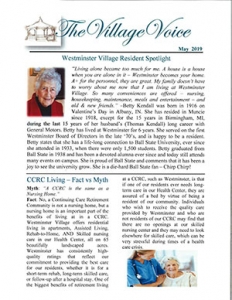Chaplain’s Corner: CIX
“If You Could Live Forever”
If you could live forever, would you want to? That question was posed to Miss Alabama
in the Miss USA competition in 1984, She replied, “I would not live forever, because we
should not live forever, because if we were supposed to live forever, then we would live
forever, but we cannot live forever, which is why I would not live forever.” Heather’s
interesting answer notwithstanding, the question of immortality has troubled and
fascinated humanity since ancient times.
According to Greek mythology, the Goddess Eos fell in love with Tithonus, a mortal from
the city of Troy. She pleaded with Zeus to grant him the gift of immortality. Zeus
complied. But Eos had neglected to specify one small detail–that Tithonus should
remain forever young. Instead he became older and decrepit with every passing year.
Billions of dollars are currently being invested by major companies in longevity
research. “Immortalists” are convinced that science will one day solve the riddles of
aging. The majority of scientists, however, remain skeptical.
Like it or not, at least for the foreseeable future, every human life has an expiration
date. We are not immortal.
That leaves us grappling with that other ancient question: Is there life beyond the
grave? Some of the smartest people in the world have come up with different answers to
that question. The late professor Armand Nicholi Jr, taught a course at Harvard for 35
years that contrasted two of the 20th century’s most brilliant minds. He summarized his
observations in “The Question of God: C. S. Lewis and Sigmund Freud Debate God,
Love, Sex and the Meaning of Life.”
Nicholi’s closing chapter on the subject of death is illuminating. Sigmund Freud, the
father of psychoanalysis and a lifelong atheist was dismayed by the fact that one day he
would die. Birthdays were occasions of despair. Throughout his life he fatalistically
parted company with others by saying, “Goodbye, you may never see me again.” In
September 1939, as cancer ravaged his body, he arranged for his physician to give him
an overdose of morphine so he could exit the world on his own terms.
For the first half of his life, C.S. Lewis was also an atheist. It can safely be said that his
conversion to Christianity at age 31 transformed his perspective on everything. That
included death. “There are better things ahead of us than anything we leave behind,”
he wrote toward the end of his life. He actually enjoyed the process of aging. “Autumn
is the best season,” he insisted, and saw the physical decline not as the final chapter of
his life’s story, but as a prelude to personal renewal. The death of his wife Joy was a
shattering experience. He acknowledged that it jolted the foundations of his faith. But
as his own death approached a few years later, he felt both peace and anticipation. He
calmly told his brother, “I have done all I was sent into the world to do.”
The news of Lewis’s death was pushed to the back pages of the world’s newspapers
because it happened on November 22, 1963, the same day JFK was assassinated.
Nicholi notes that Christians have always had ambivalent feelings about the end of
life. Death and loss are clearly Plan B in God’s world–the result of things going very
wrong. But death itself, specifically the death of God’s Son, became the very means by
which God rescued us. We are not going to live in this world forever. Death, however,
does not get the last word. Therefore one of the Holy Spirit’s primary jobs is to prepare
us to face death without fear.
People commonly speak of passing into death as if we were fumbling into an abyss where
everything will be lost. That was Sigmund Freud’s lifelong fear. But it’s more accurate
from a biblical perspective to say that we go through death into something wonderful.
We leave the small corner of God’s neighborhood so we can relocate into a vast
hemisphere of divine real estate.
Jesus assures his followers that we are heading for a reunion like no other welcoming
party. No wonder the Bible’s most oft-repeated command is, “Don’t be Afraid.”
Life can be tough. And death can seem so deadly. But because of the One who put death
out of commission on the cross, all shall be well at life’s end.
Faithfully, Ron Naylor, Chaplain




